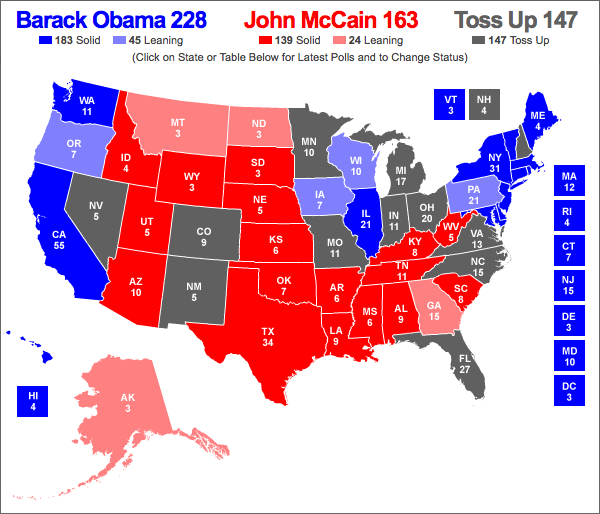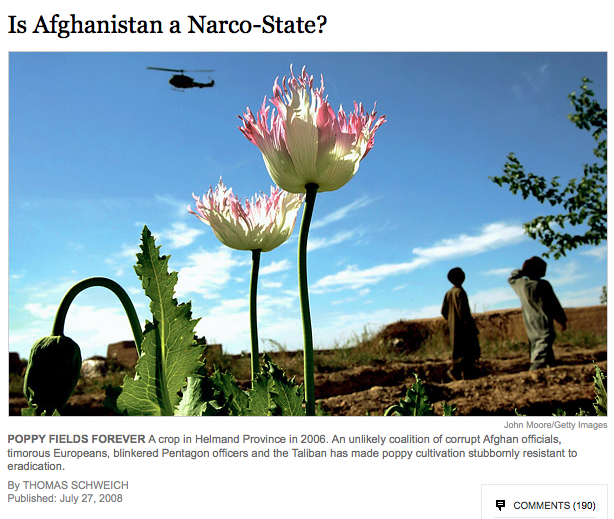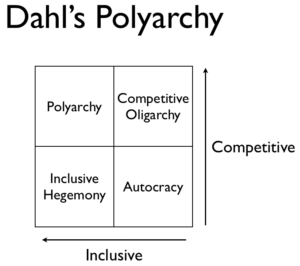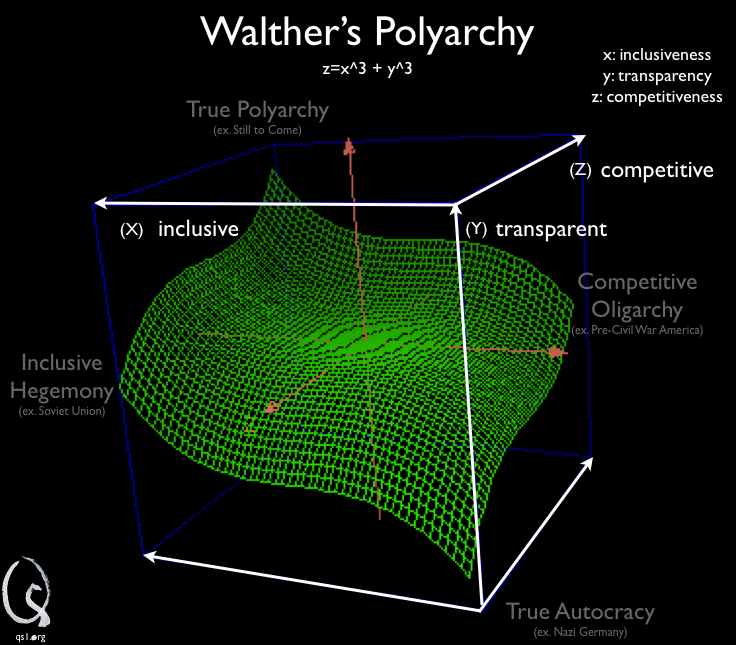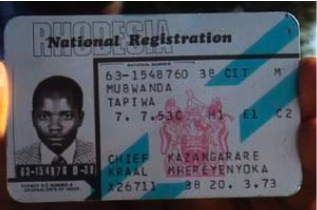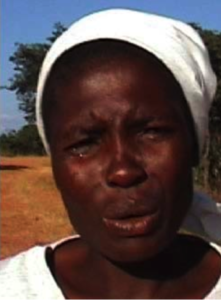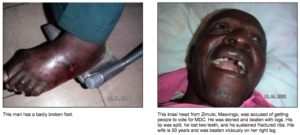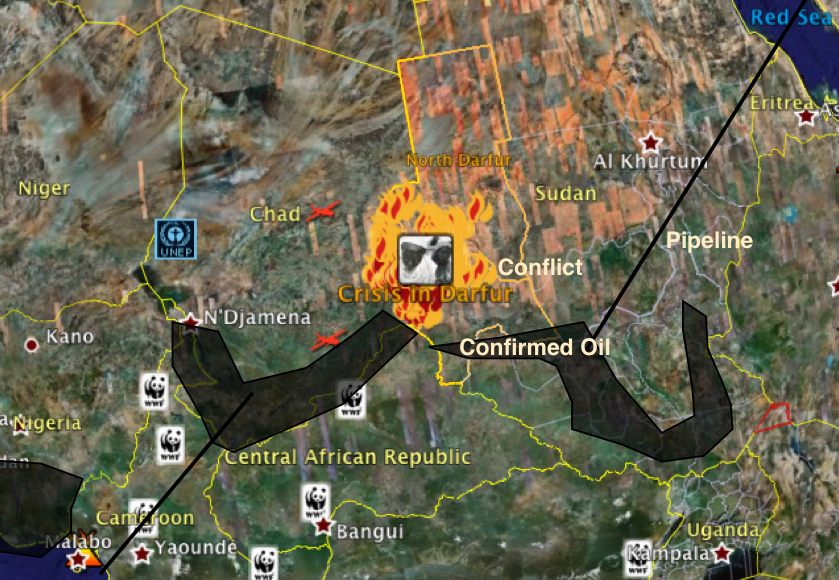 If you’ve been watching the news for the last month, it seems like John McCain might actually pull out a victory in November. After months of the press fawning over the unlikely candidacy of Obama (remember, he’s a mixed race junior senator with no executive experience) the press has rediscovered that John McCain actually has the credentials, the political persona and the charisma of a fantastic presidential candidate. Unfortunately for Senator McCain, he simply doesn’t have the support. Despite popular polls numbers (this isn’t a popular election after all, it is a state by state winner take all contest) and a receptive media, eight national trends would make a John McCain victory miraculous.
If you’ve been watching the news for the last month, it seems like John McCain might actually pull out a victory in November. After months of the press fawning over the unlikely candidacy of Obama (remember, he’s a mixed race junior senator with no executive experience) the press has rediscovered that John McCain actually has the credentials, the political persona and the charisma of a fantastic presidential candidate. Unfortunately for Senator McCain, he simply doesn’t have the support. Despite popular polls numbers (this isn’t a popular election after all, it is a state by state winner take all contest) and a receptive media, eight national trends would make a John McCain victory miraculous.
Voter Registration
The Republicans are losing more and more registered voters to the Democrats and independents while the Democrats are registering unprecedented numbers of young, black and formerly disenfranchised voters.
Real Clear Politics states: “The number of registered Democrats in party registration states has grown by nearly 700,000 since President George W. Bush was reelected in November 2004, while the total of registered Republicans has declined by almost 1 million.”
The changes are most notable in Iowa and Nevada, two states that were majority Republican in 2004 (and voted for Bush) and now have more registered Democrats. The other 5 states with growing democratic advantages are Oregon (10pts), New Jersey (14pts), New Hampshire (-.6pts), Connecticut (15pts) and Pennsylvania (12pts).
By most accounts, the Obama campaign machine has been impeccably organized, and it isn’t hard to understand why the Republican machine is failing. Quite simply, being a Republican is no longer as cool as it used to be. As the Economist so aptly noted a year ago, no matter how clever the Republicans are at politics, at the end of the day when they were given the chance to lead, they failed.
Organization
Obama has 336 open offices while McCain has just 101. While field offices, like voter registration, doesn’t directly correlate to voters, one has to wonder where the McCain campaign will base their get-out the vote operations when the election arrives. More specifically interestingly, McCain has 1 office in Colorado and 1 in Pennsylvania while Obama has 10 and 18 respectfully.
Independents
The 1.7m net loss net of Republicans since 2004 means independents are more important for McCain. Historically he has garnered much support from independents but Obama is denying him an advantage as polls show them neck and neck.
Millennial Generation
One day, the Millenials, which are Americans under the age of 26 and are the largest generation in American history, (over 100m) will dominate American politics. Obama has a massive advantage amount youth and his campaign has vigorously registered and engaged this demographic. Whether or not this is the election that will permanently shift America politics from the Boomers to the Millennials, it’s clear that Obama has the age demographic advantage as there are nearly twice as many 18-30 year olds than there are people over 65. For more go try USA Today and Wikipedia.
Latinos
While Hispanics gave Bush an advantage in 2004 by giving him 40% of their vote, McCain will be disadvantaged by the fastest growing demographic in America. Obama has a massive lead of 3:1 (63% to 23%) among Hispanics.
Evangelicals
McCain is polling at 61% support among Evangelicals while Bush won 69%. They aren’t going to Obama, who has the same 25% Kerry had in 2004, they’re simply deciding to sit this one out. Why? Many of their leaders want to disengage from American politics while others are under the influence of a right wing media that has historically despised Senator McCain.
Rush Limbaugh
America’s second most listened to talk show host (all hail Howard) thinks McCain sucks and hasn’t and will not motivate his listeners to vote for him. In fact, he often threatens to work against McCain if McCain doesn’t veer more towards the right.
Read this transcript from his show:
RUSH: Because [the Republican Party] thinks that they own us, in the most crucial of earlier decisions, McCain is misjudging us. He feels he can pick whoever he wants, pro-choice Democrat running mate, and that everybody’s just going to march with him. But he figures wrong. This is going to be a close election, and it’s not going to take a lot of people sitting on their hands to lose an important state or two.
CALLER: Mmm-hmm.
RUSH: Now, Obama is out there firing up his base. McCain is trying to deflate people like you.
CALLER: He’s angering us, and I wasn’t going to vote for him. I was just not going to mark anything, but then when he pulled this — and I think, Rush, I really think — and I know you’ve done so much to get the word out. I really think that if he puts on a good, strong conservative, he has a pretty good chance of getting elected. But if he doesn’t, then the Republicans are going to say, “What’s the difference between him and B. Hussein Obama?” And they either won’t vote or I don’t know, and it’s really scary and I’m worried about it. I don’t like McCain; I never have liked him.
Bush’s victory was consistent with years of right wing media narration. Those same people have been skewering McCain for a decade. Now if they wanted to do an about face and support McCain, they would risk alienating their own audiences.
Libertarians
Ron Paul’s revolution is continuing via Bob Barr, a former popular Republican who turned to the Libertarian party and was polling at 6%. Unlike Nader who was a simply protest vote in 2000 and 2004, Barr and Paul, while not officially linked, are both aiming to realign the Republican party around an authentic small government platform. Paul and his followers are vigorously organizing the “Campaign for Liberty” which will create a constituency that could support a real libertarian third party or could begin to realign the Republican party. Paul has frequently stated he won’t support McCain unless McCain fundamentally changes his platform. There will be no better way for the libertarians to flex their political muscle than resisting a McCain’s presidency.
Conclusion
As I see it, McCain is disadvantaged by national political trends, he lacks a competitive ground organization, he isn’t dominating the independent vote, he has an age demographic problem, he has a latino problem, an African American problem, an Evangelical problem and isn’t garnering support from right wing media celebrities. Finally, there is a large and growing consistency within his party that would prefer to lose this election and return the Republican party to a small government platform than continue with business as usual.
Least we forget, the media is a business and they would prefer to have a ‘horse race’ political campaign going than inform Americans of the massive demographic hurtles McCain faces. They would also prefer to report on national poll numbers that represent the insignificant popular vote than look at state by state numbers that clearly show an Obama advantage. Take a moment to go through Real Clear Politics electoral college and see for yourself.
